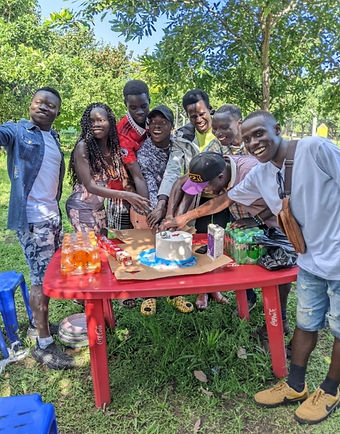Peer-to-Peer Training
We continued to build the capacity of our group of Children Born of War by equipping them with skills and knowledge on mental health so they could support themselves, their families and communities to heal, and transform lives in the aftermath of conflict and socio-economic shocks in northern Uganda. This training is important because there is lack awareness and limited access to mental health support among youth and local communities.
With support from the Global Reconciliation Advocacy and Community Engagement organisation (GRACE International), a group of Children Born of War were engaged in a two week training course conducted in Gulu district by the clinical psychologist, Ms Toneva Peace and Co facilitator Mr. Ebong Bernard.
The training covered 12 modules including; Recovery, My Tree of Life, Peer Support, Communication, Building on Strength, Community and New Perspectives, Role Description, Group Facilitation, Work Preparation, Peer Network, Stigma, Rights and Advocacy, Trauma and Dealing with Catastrophe, and Conflict Resolution. Each module ended with a reflection, relaxation exercise and home work.
"I love the peer to peer approach because you are able to teach each other and learn from one another"

Participants during a group work session
Learning methods
The training enabled participants to share their knowledge, explain their ideas, and discuss their opinions in a group. They presented and gave valuable feedback to each other.

Participants demonstrating role play of giving peer to peer support
Using peer-to-peer support as a strategy
Peer support can be an effective strategy for assisting people who suffer from mental health issues. Through this process, individuals might realise they are not alone in their experiences, or the problems they face. Peer support can provide them with insight into their situation and broaden their knowledge. This can help them better understand their issues in a comfortable and safe setting.

Each trainee was assigned a guardian peer to support them during the course whom they could contact if needed.
This training provided a space for participants to feel accepted and understood. Each perspective was treated equally. The training not only provided the group with skills and knowledge for themselves but has also prepared them to become peer support workers within communities in Northern Uganda.
"I enjoyed the training after taking part, I acknowledged skills and knowledge gained but also better mental health, presentation skills and less self-stigma for seeking help"

Participants during peer to peer experience sharing
The peer trainees also reported to have enjoyed the training. They valued the chance that was given to them to learn new skills which would enable them to socialize and help other CBIC across the country and globe.
Brian and Moses engaging in problem solving techniques
Sharing knowledge among peers is less intimidating. There is a willingness to make mistakes and learn from them from this kind of setting.


Toneva Peace (facilitator) awarding a certificate to participants for the successful completion of peer to peer training

The farewell cake for CBOW

Lanyero Yona Peace during her happy moments at the training
Participant’s having their farewell party after successful completion of the training


Moses and Brian enjoying their moments at Acwa water falls
Participants enjoying Acwa waterfalls after the farewell party
